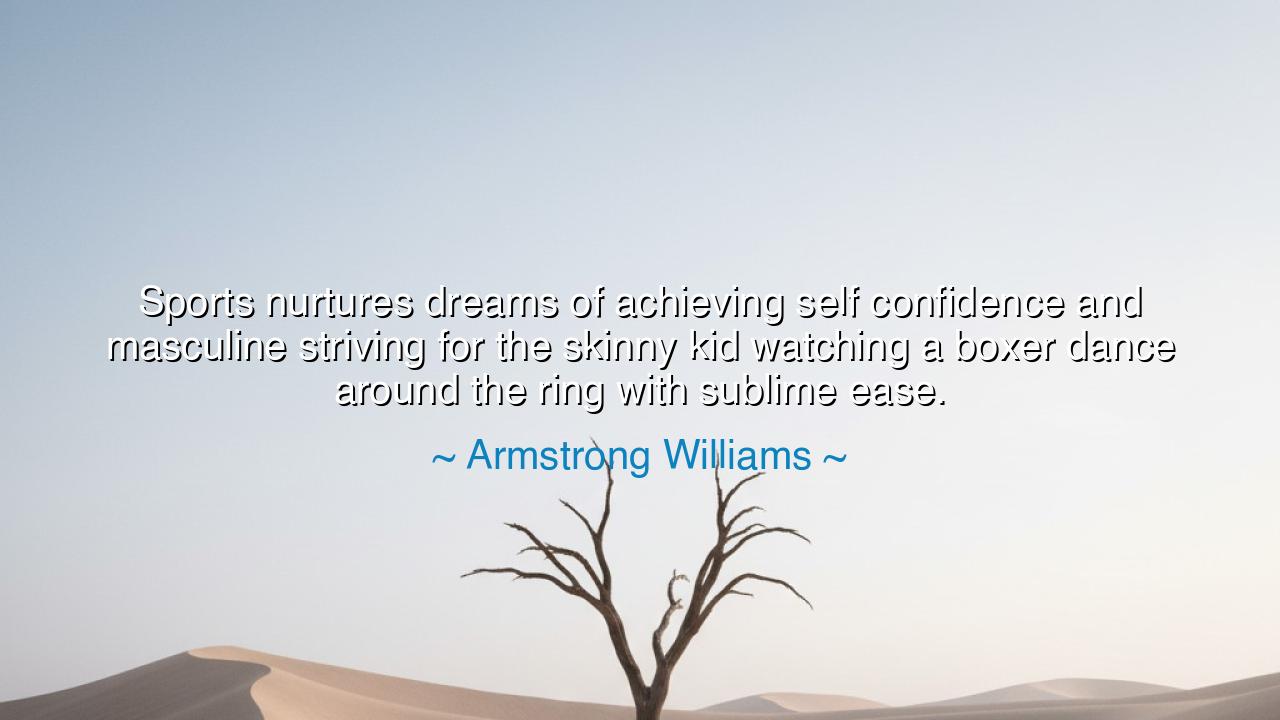
Sports nurtures dreams of achieving self confidence and masculine
Sports nurtures dreams of achieving self confidence and masculine striving for the skinny kid watching a boxer dance around the ring with sublime ease.






Hearken, children of spirit and struggle, and listen to the words of Armstrong Williams, who spoke of the quiet power of aspiration: “Sports nurtures dreams of achieving self-confidence and masculine striving for the skinny kid watching a boxer dance around the ring with sublime ease.” This is no mere reflection on athletics — it is a hymn to the transformative fire that lives within the human heart. It speaks of the way that sports serve as a mirror of courage, a field where the weak discover strength, and the timid awaken to the boundless potential within themselves.
In these words, Williams gives voice to a truth as old as the arena itself: that every champion’s performance is a beacon for the unseen dreamers who watch from the shadows. The “skinny kid” symbolizes every soul who feels small, overlooked, or powerless, yet dares to hope. When that boy sees the boxer move with grace and strength, when he witnesses mastery born of discipline, he realizes that greatness is not an inheritance but a creation. Sports, then, become more than a contest of bodies — they are a forge of the spirit.
The “boxer dancing around the ring with sublime ease” evokes the archetype of human will refined into art. Think of Muhammad Ali, whose every movement spoke not only of physical power but of divine confidence. His speed, his grace, his poetic defiance — all became a language of liberation for millions who felt voiceless. Ali did not merely win fights; he gave a generation permission to believe in itself. For the child watching him, trembling with admiration, a seed of faith was planted — faith that effort, courage, and perseverance can transform frailty into strength.
The ancients understood this well. In Greece, where the Olympic Games were born, athletics was seen not merely as sport but as a sacred act, a reflection of divine order. The runner, the wrestler, the discus-thrower — each was a living symbol of the soul striving toward excellence, toward arete. Their contests were offerings to the gods, but also to their own higher selves. In them, the spectators saw not just competitors, but models of discipline and beauty — proof that the human being could transcend limitation through devotion.
When Williams speaks of “self-confidence and masculine striving,” he invokes not arrogance, but the quest for inner balance and mastery. The masculine principle here is symbolic — it represents the force of assertion, the drive to act, to overcome, to protect and create. It is the part of every human soul — male or female — that yearns to stand firm in adversity. Sports awaken this force, teaching humility through defeat and resilience through challenge. In that dance between triumph and loss, character is formed.
The story of Jesse Owens shines as a timeless embodiment of this truth. A young black man from a humble background, he entered the 1936 Berlin Olympics under the shadow of fascism and prejudice. Yet on that world stage, he ran with such courage and grace that he shattered both records and racist ideologies. For countless dreamers, his victory was not just athletic — it was spiritual. It declared that greatness belongs to no race, no class, no chosen few, but to those who dare to strive.
The lesson, then, is clear: sports are not merely games, but living parables. They teach that the impossible is only an illusion, that discipline transforms fragility into strength, and that the smallest among us may rise to inspire nations. Every movement on the field, every punch in the ring, every drop of sweat shed in practice becomes an offering to human potential itself.
So let Armstrong Williams’ words echo as a call to all who dream: nurture the spark within. Watch those who move with mastery not with envy, but with awakening. For what you see in them is not something alien, but a reflection of what already lies dormant in you. The dream, the confidence, the striving — they belong to all who dare to act, to train, to believe. In the end, the boy watching the boxer is not merely a spectator — he is a soul being called to rise.






AAdministratorAdministrator
Welcome, honored guests. Please leave a comment, we will respond soon